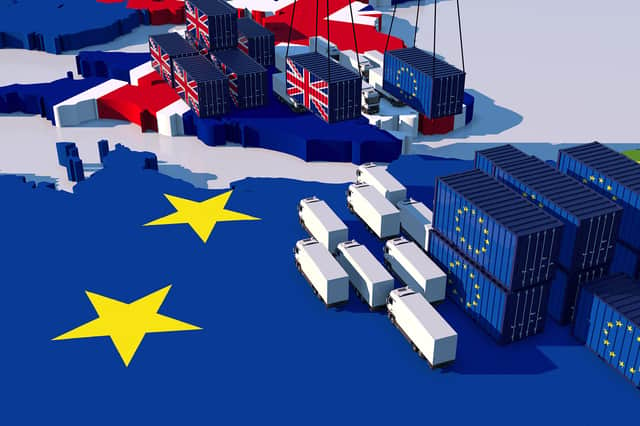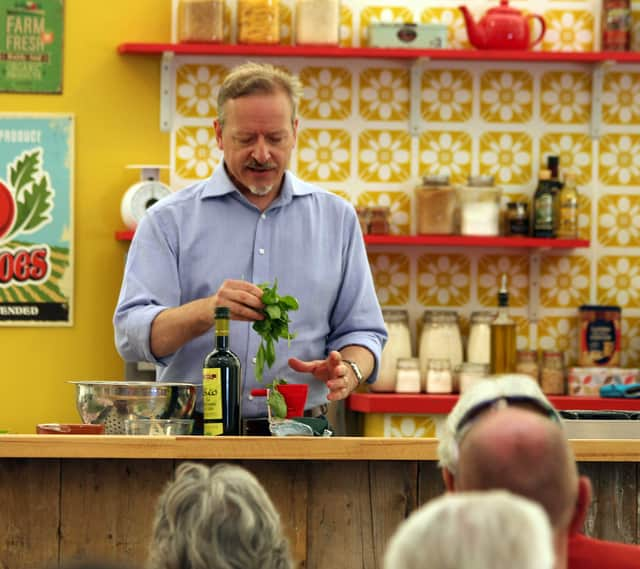Brexit: new import charges of up to £145 on meat, dairy and plants ‘could push food prices up’
and live on Freeview channel 276
New import charges could push food prices up, the government has been warned, as more post-Brexit red tape is set to hit small businesses.
Importers will have to pay up to £145 to bring small amounts of products such as cheese, salami and fish through the port of Dover or the Eurotunnel from April, as part of the UK’s new border model.
Advertisement
Hide AdAdvertisement
Hide AdThe fee is intended to cover the cost of operating the border control posts introduced after Brexit, and will not apply to goods brought into the UK for personal use. Previously, when Britain was part of the European Union, meat and dairy produce could be imported without checks.
However, now UK businesses have been hit with additional red tape and costs, despite the promise that Brexit would reduce bureaucracy. And importers have warned that the new charges could lead to higher prices for consumers.


The Cold Chain Federation’s chief executive, Phil Pluck, said: “Ultimately, this will increase business costs and food prices and potentially lower choices for the shopper.” He added it was “extremely disappointing” that the charges had been announced “at the last minute”, leaving businesses with little time to make any necessary changes.
Pluck said: “This is in no way helpful to UK-based importers and the whole EU supply chain. It reinforces the Government’s slapdash approach to a vital part of UK PLC.” James Barnes, chairman of the Horticultural Trades Association, said the announcement “confirms our fears that in just one month, UK horticulture’s competitiveness will be again hit by a cost hike for no material gain”.
Advertisement
Hide AdAdvertisement
Hide AdAdding that the policy “feels like it is constructed on the back of an envelope at best”, Barnes warned that the charges would “undoubtedly increase costs” and increase the likelihood of empty shelves in supermarkets.
Paolo Arrigo, managing director of Seeds of Italy, imports the historic Italian Franchi seed brand to the UK, which has been in the same family for seven generations. He sells endangered, regional and heritage seed varieties to wholesalers, garden centres and the Royal Horticultural Society.
He told NationalWorld that importing had become much harder following Brexit, and that the new checks would add even more red tape. “I had one shipment early on with Brexit that was returned because it was written in blue ink and not black,” he said. “There's lots of inconsistencies, different interpretations of the same rules from different health inspectors, different hauliers, different shippers.”
Arrigo will now have to arrange a phytosanitary certificate and plant passport for each variety: “Have you ever applied for a passport? I have to do that every order … you can imagine how long that takes. All of these extra things, delays, cost money.”
He explained that the new import checks could put some seed companies out of business, saying they would have a disproportionate effect on SMEs (small and medium-sized enterprises). In April, the government is bringing in a charge as medium-risk products will undergo documentary, identity and physical checks at the border.
Arrigo is concerned that his orders of seed varieties from different artisan producers will be slapped with multiple fees. “Who's this penalising? Small business,” he said exasperatedly. “This is on top of all the other things we've got to do. There’s gonna be less choice, there's gonna be higher prices - this is not rocket science.”


‘Shoppers and businesses will be deeply worried about prices being driven up again’
Labour shadow minister Nick Thomas-Symonds said: “British shoppers and businesses already suffering with the Conservative cost-of-living crisis will – rightly – be deeply worried about prices being driven up yet again.
“Labour has warned about the impact of these measures and the potential for chaos with new border checks. With less than a month before their introduction, we know know what the costs will be.
“Labour has a plan to reduce costly bureaucracy, through seeking to negotiate a veterinary agreement with the EU to massively reduce the need for checks, helping make food cheaper and our businesses more competitive.”
Advertisement
Hide AdAdvertisement
Hide AdThe fee will be charged per type of product imported, and will vary from £10 to £29 depending on the risk products present. It will also be capped at £145 for mixed consignments.
A government spokesperson said this was “within and at the bottom end of the range which we consulted with industry on”. They added: “The charge is designed to recover the costs of operating our world-class border facilities where essential biosecurity checks will protect our food supply, farmers and environment against costly disease outbreaks entering the UK through the short straits.
“The charges follow extensive consultation with industry and a cap has been set specifically to help smaller businesses. We are committed to supporting businesses of all sizes and across all sectors as they adapt to new border checks and maintaining the smooth flow of imported goods.”
The introduction of post-Brexit border checks has been delayed several times over fears they could fuel inflation, but began to be introduced from the start of this year. The Environment, Food and Rural Affairs Committee has written to Steve Barclay, the Environment Secretary, to express unease about some of the preparations the government has made.
Advertisement
Hide AdAdvertisement
Hide AdGoods from Britain have faced similar controls from the EU since it left the single market in 2021, but the UK has repeatedly put off checks in the other direction. Committee chairman Sir Robert Goodwill said he was concerned over plans that would see departmental funding for spot checks on products of animal origin at Dover reduced by around 70%.
The Tory MP said: “We remain concerned about the location of the physical checks that will be undertaken for commercial loads.” Under the new post-Brexit system, dubbed the Border Target Operating Model, health checks on foods arriving at Dover will be carried out at a facility in Sevington, Kent, about 22 miles inland. The Dover Port Authority has been among those expressing concern about the plan, as well as the prospect of funding cuts.
Ralph Blackburn is NationalWorld’s politics editor based in Westminster, where he gets special access to Parliament, MPs and government briefings. If you liked this article you can follow Ralph on X (Twitter) here and sign up to his free weekly newsletter Politics Uncovered, which brings you the latest analysis and gossip from Westminster every Sunday morning.
Comment Guidelines
National World encourages reader discussion on our stories. User feedback, insights and back-and-forth exchanges add a rich layer of context to reporting. Please review our Community Guidelines before commenting.
